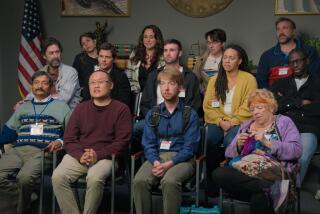PERSPECTIVES ON CRIMINAL JUSTICE : Unanimity Isn’t Human Nature : It’s unrealistic to expect 12 people to have the same opinion on anything--especially a grave criminal matter.
- Share via
America has allowed less than unanimous verdicts for more than 200 years. James Madison wrote the Sixth Amendment to include a requirement for unanimous verdicts, but Congress deleted that provision before sending the Bill of Rights to the states for ratification. The reason: Four of 13 states did not require unanimity and Congress was disinclined to force them to do otherwise.
Oregon’s super-majority jury system has worked well for half a century. At least 10 jurors must agree to a felony verdict. There are fewer hung juries and fewer retrials, and nobody has seriously claimed that guilty defendants are culled from the innocent less accurately in Oregon than elsewhere. Similarly, England and most of Australia allow super-majority verdicts and Scotland has traditionally required only 8 out of 15 jurors to reach a verdict. Nobody has suggested that juries in Oregon, England, Australia or Scotland produce less accurate decisions than elsewhere.
The historic reason for juries was to allow the people, rather than kings or even judges, to decide guilt or innocence. Juries began as gatherings of witnesses. For the people rather than the king to decide, however, it was not necessary for a particular number of jurors to agree. A super-majority of one’s peers is a sturdy bulwark against oppression by the state.
Non-unanimous verdicts should not be considered a “get tough on crime” strategy. Jurors are not necessarily the prosecutor’s friends. The question is whether super-majority verdicts improve the justice system. The answer is that they allow more accurate and more efficient decision-making by jurors, whether for convictions or acquittals. A study by the University of Chicago Law School showed that the ratio of convictions and acquittals was about the same under either system, but that the number of hung juries was reduced by more than 40% where 10 or 11 jurors could decide.
The strategy of many defense lawyers, particularly when the prosecution’s case is strong, is often not to seek an acquittal, but to hang the jury by choosing at least one juror with the temperament to hold out against the others and to convince this juror to do so. Such lawyers try their cases to one juror instead of to 12. I do not criticize defense lawyers for using every legal advantage for their clients, but there is something fundamentally wrong with a system of justice that makes indecision a victory. The purpose of a trial is to produce a decision. A hung jury is not a success for the jury system. To the contrary, a hung jury represents a failure of the justice system to produce a decision.
Perfect unanimity is simply not consistent with human nature. Seldom do 12 people hold the same opinion, particularly on grave matters. In ancient times, juries were starved into unanimity; often they were denied food and sleep until they reached a verdict. Today, jurors are sequestered together until they reach a unanimous verdict. Too often, they reach compromise verdicts instead of verdicts that truly reflect the convictions of the individual jurors. That is why armed robbers and rapists are sometimes convicted merely of assault. When the majority must compromise with an unreasonable, biased or screwball juror in order to reach a verdict, justice suffers. When jurors can vote their minds without the need to compromise, the verdict better reflects the truth.
It is also argued that the super-majority system allows jurors to ignore the views of dissenters. That is contrary to my observations. Jurors are very conscientious about how they perform their responsibility. As a matter of human nature, they allow everybody to have his or her say, usually before they even take a vote. They strive hard for unanimous decisions even after 10 or 11 jurors have agreed. Majorities tend to return non-unanimous verdicts only when they believe that further discussion is futile.
In no other decision-making body, even those that make society’s most important decisions, do we require 12 people to agree. In every collegial decision-making body, there is some allowance for difference of opinion, whether reasoned, biased or crackpot. Even the Supreme Court, deciding matters of life and death, is seldom unanimous. The important thing for criminal juries is that those who agree do so with a depth of personal belief that is beyond a reasonable doubt. To require that 10 or 11 people hearing conflicting evidence each bear the same opinion is a very high obstacle to injustice.
More to Read
Sign up for Essential California
The most important California stories and recommendations in your inbox every morning.
You may occasionally receive promotional content from the Los Angeles Times.













